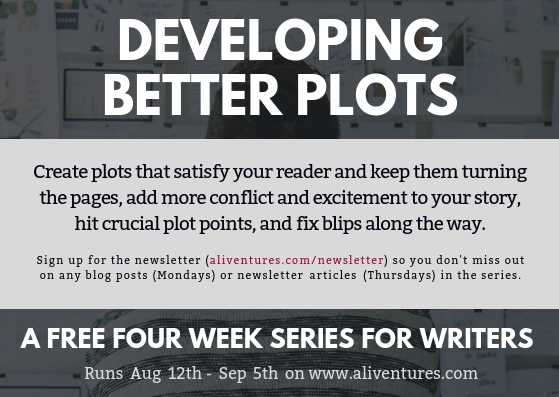How Much Research Do You Need for Your Plot to Hold Together?

This is the second post in our series on “Developing Better Plots”. If you missed last week’s post, you can find it here: What is Plot … and is it the Same Thing as Story or Narrative?
Confession time: research is definitely not my favourite part of writing.
The parts of the writing process I enjoy most are drafting (when I get to see the story unfold) and rewriting (when I get to bash the story into shape).
Of course, there are plenty of authors out there who love research! Some hugely enjoy it for its own sake, and others, at the very least, find it a good way to put off starting on the actual writing:
I do relish the research period before you start actually writing in earnest: you’re just sitting around, sifting through books and articles, following links, and playing detective. There’s something wonderfully open-ended about it, without the actual pressure of having to produce your own words. (This is why it’s such a seductive procrastination device.)
– Research As You Go, Steve Johnson, Medium.com
So – whether you love it or not – how much research should you do before you start?
All Authors Need to Do SOME Research
We often associate heavy-duty research with historical writers poring over tomes of detailed information about the past, or crime writers wanting to accurately portray how the police go about their work.
But all writers will need to do some degree of research.
Even if you’re writing fantasy, you may well want to draw on real world events, geography, or cultures (as George R.R. Martin does for his Song of Ice and Fire books). If your characters are human, you might also need to research things like how long it takes broken bones to heal.
With science fiction, you may well need a grasp of the science of what you’re writing about (even if you’re not writing hard SF). For instance, if you want to include convincing near-lightspeed travel, you may want to research how going that fast affects time.
Even if you’re writing a contemporary short story set in your own town, you still might need to look up road names, find out which bus goes down which route, or check a coffee shop’s opening times.
Be Careful You Don’t Base Plot Events on Assumptions
One key reason to do at least some of your research before writing is that you don’t want to end up basing something important on an assumption – only to end up doing a lot of rewriting to make everything fit together.
Even something as simple as having your character travel from Location A to Location B can be an issue. For instance, on the London Tube, you definitely can’t get from Charing Cross to Greenwich in three stops … despite what Thor: The Dark World would have you believe.
With historical fiction, these assumptions definitely need to be tested up front. For instance, if you’re writing a novel set in the early 1700s, your characters aren’t going to be able to travel from Edinburgh to London in a couple of days — it’s going to be more like two weeks.
But … You Don’t Have to Do All Your Research Up-Front
Unless you outline your stories in minute detail, you’re unlikely to do all your research before writing a single word. Some of it will take place after the first draft: things like “would this character use this particular phrase?” can be easily checked and (if necessary) changed when you’re editing.
Of course, research can also provide ideas for your story/plot — you may not want to plot too tightly in case new ideas come to you.
Most authors will turn to the internet and to books for their research, but it can sometimes be tricky to get the details you need (and, in the case of the internet, to know how accurate the information is).
So I wanted to offer some practical advice on actually doing the research – and as I’m not much of a researcher myself, I asked author Nick Jones (a long-time Aliventures reader) to write about his researching experience for us. Here’s what he said:
Can’t Find the Details You Need? Just Ask
When I began work on my first novel (‘Kings Cross’, published in 2015), I had to describe an intricate and tense scene on the London Underground. As a regular traveller, I was familiar with the underground network but didn’t really know how it worked. So I travelled by tube to Walthamstow – one of the Victoria Line’s starting points – explained the reason for my visit and asked if I could have a chat with the station manager. In his control room in the bowels of the earth, he gave me a fascinating half-hour teach-in on how they keep the trains running. All I did was ask and everybody at LT was kindness itself.
Likewise with Book 3 (‘I Am Lucy’, due to be published by YouCaxton on 23rd September), I was valiantly trying to get to grips with the inner workings of a Roman Catholic convent, around which much of this story of abduction revolves. Wikipedia research was barely scratching the surface until I found a wonderful friend in Sister Julie Anne, attached to The Franciscan Sisters of Christian Charity in Wisconsin, who courteously answered all my emailed queries by return – always signing off “God Bless”.
The acknowledgements page of ‘I Am Lucy’ lists 19 individuals and organisations who I turned to for help, from the Swiss government’s tourism office (my imaginary convent was on the banks of Lake Lucerne) to a leading child trauma specialist. No-one turned me away and nobody even hinted that they expected to be paid for their service.
What is known in publishing as ‘police procedure’ can be a real minefield (the English-Canadian crime novelist Peter Robinson, creator of the Inspector Alan Banks series, is often cited as the most accomplished of all police procedure writers). With police matters you certainly can’t afford to ‘wing it’, as there will almost certainly be a retired police officer out there somewhere who will pick you up on even minor procedural errors. With my new book, I was immensely fortunate to have the advice of a retired policeman – who checked all the relevant chapters – as well as receiving several helpful pointers from The College of Policing.
So the simple moral is: if you are unsure of the facts, but want to give your readers an accurate picture which is above reproach – just ask.
Nick Jones
Details of all Nick’s books and how to purchase them can be found on his website www.ampersandworld.co.uk.
So: if you’re struggling with your research, there’ll be plenty of people out there who can help … whether you’re developing a story idea, working on a first draft, or checking that your facts are correct as you edit.
Don’t feel you need to get every single detail nailed down before you start your novel; equally, though, don’t rush too fast into writing without making sure that the bare bones of your plot will, in fact, hang together.

Want to develop stronger plots for your short stories and/or novels?
We’re going to continue talking about plot for the next three weeks, looking at things like how to add more conflict, how to structure your plot, and how to fix pesky plot holes.
Make sure you’re on the newsletter list so you get both the Monday blog posts and the short Thursday newsletters straight to your inbox.
About

I’m Ali Luke, and I live in Leeds in the UK with my husband and two children.
Aliventures is where I help you master the art, craft and business of writing.
Start Here
If you're new, welcome! These posts are good ones to start with:
Can You Call Yourself a “Writer” if You’re Not Currently Writing?
The Three Stages of Editing (and Nine Handy Do-it-Yourself Tips)
My Novels

My contemporary fantasy trilogy is available from Amazon. The books follow on from one another, so read Lycopolis first.
You can buy them all from Amazon, or read them FREE in Kindle Unlimited.


Very interesting! Personally, I like researching – I’m writing about something I’m passionate about, so research is fun. It also helps that I write fanfiction, so I can be sure the wiki – and my own experience – is accurate.
Research for procrastination… I’ve seen it before. I’ve said ‘I don’t get writer’s block,’ but that jumped on me recently. I even re-read my own story to procrastinate!
Ask if you don’t know… I have to ask my sister, who stars in my current book, things about her all the time. I certainly understand that route!
Thanks for the post, I really appreciate it!
Hi again Ali! I have read two other posts of yours and I really enjoyed this one, too. Generally speaking, I enjoy research. Although I do not enjoy research + time constraints. If I have plenty of time to research and take myself occasionally off course, I enjoy it quite a lot. That being said, mostly the research I do is for short form essay writing. I write freelance for now with an awesome online platform called Ultius, Inc. that connects me with clients directly. I get paid per page so I can earn quite a bit if I dedicate my time to it. The writing topics vary and I will sometimes take on projects that help me expand my areas of expertise. I highly recommend writing with them!